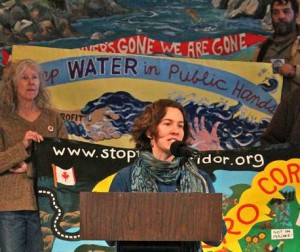 Heather Retberg giving her address at the Rally for Unity Heather Retberg giving her address at the Rally for Unity |
Maine is ahead of the curve on food freedom with eleven towns in the state having passed food sovereignty ordinances. One of the leaders in the freedom movement, Heather Retberg, gave the following speech to Maine residents at the Alliance for the Common Good’s Rally for Unity in Augusta, Maine on January 8th, 2015. It is published here with permission.
I’ve been asked to share with you today words about food sovereignty and farming, about access to food from farms in Maine, about how communities can determine how our own food needs are met.
Water is life. And, FOOD is life. We have a right to life. We have a right to food.
How do we protect this right? Four years ago, my town passed the Local Food and Community Self-Governance Ordinance. The regulatory climate around selling milk and meat from our farm directly to our customers was shifting, becoming uncertain, less tenable. We first came here, to Augusta, to speak truth to power, to warn of unintended consequences, to appeal to a committee and regulators to make scale-appropriate, safe regulations for our community. We were told that there were federal, financial, and legal barriers to scalable regulation, that the Department of Agriculture’s hands were tied and the legislative committee of oversight couldn’t act on behalf of the people. So we went back home, to our towns. We kept speaking truth. We took back our power.
This led the farmers and eaters in our community to discuss some serious questions: Who decides? Who decides what we eat? Who decides if we have access to food that we choose? Who decides if we have access to food that sustains our health and our economies? Just WHO or WHAT was making these decisions? And, even more importantly, who had the right to decide?
The answers to these questions led us down the road that brings me here to all of you. I didn’t come today to speak truth to power. I came to find all of you, to meet you, to learn from you, and to share our experiences with you, to encourage you to use your power. I’ve come to share with all of you some dusty tools of democracy that we re-discovered and used to protect our traditional ways of exchanging food, our access to food raised from farms, and our right to community self-governance. These tools can be used by all of us to protect our water, our air, our soils and our food—everything and anything that impacts our health, safety and welfare.
What is food sovereignty? Food sovereignty puts those who eat and those who grow food at the heart of the decision-making about our food and farming rather than the demands of markets and corporations. It says that access to food is a human right. It prioritizes local and national markets, and empowers peasant and family-farmer driven, ecological agriculture.
Our expression of food sovereignty in Maine has been to regain democratic participation and voice in food policy, to ensure the survival of small-scale farming, to maintain scale-appropriate rules around food production, to grow community resilience, to strengthen local economies, and to preserve personal freedom of choice about food. HOW?
We experimented! In a “laboratory of democracy”…our own town meeting. In a 1932 ruling, Justice Louis Brandeis famously used the term “laboratories of democracy” to describe states as innovators of policy-making. The sheer diversity of 50 states as experimental innovators of policy was recognized as an important strength of our society. The local level of governance offers a much greater number of such laboratories. Maine alone has some 500 municipalities—an opportunity for ALL of us to go home and tinker. Research. Experiment. Test and try it out. This is the scientific method at its best, AND at its least risk of harm.
Democracy is all about experimentation and innovation.
Maine is one of the strongest home rule states in the nation making us a natural “laboratory” for policy innovation. The reasonable attempt of our towns to solve the problems we face through local laws is “good faith policy innovation.” Of those 500 towns in Maine, fewer than twenty have exercised this constitutional authority asserting the right to community self-governance to protect our water, land or our access to food. Fewer than twenty! There’s still a lot of room for innovation to grow, much room still to experiment.
Here are 2 of the important tools we can all use, whether we are working to protect land, water, air, food or farming:
1. Home Rule. This exists both in our state constitution and statute. It says that local ordinances shall be “liberally construed to affect their purposes.” It presumes that any ordinance enacted is a valid exercise of a town’s authority. It states that the legislature can’t deny or preempt the power granted to the towns unless the ordinance frustrates the purpose of any state law. (I can provide you with a copy of Maine’s statute.) THIS is a great tool for local policy innovation and good faith experimentation.
2. State Constitution. Power is Inherent in the People. Article 1, Section 2 states that “all power is inherent in the people; all free governments are founded in their authority and instituted for their benefit, [and that] they have therefore an unalienable and indefeasible right to institute government and to alter, reform, or totally change the same when their safety and happiness require it.” THIS is a great tool for local policy innovation and good faith experimentation.
These tools can be used in our communities—our school gyms, our grange halls, our church basements, city councils and our town halls. Those are the true halls of power if only we will use the tools we have. They are the tools of community self-governance, of innovation and the power of the people.
When you return home, I encourage you to Go Local—with food and farming and policy innovation! It’s high time for some good faith experimenting.
Heather Retberg is a member of the Farm-to-Consumer Legal Defense Fund (FTCLDF). The FTCLDF has backed the food sovereignty movement in Maine since 2011 with representation of farmer Dan Brown and support of legislative efforts.
YOUR FUND AT WORK
 Services provided by the Farm-to-Consumer Legal Defense Fund (FTCLDF) go beyond providing legal representation for members in court cases.
Services provided by the Farm-to-Consumer Legal Defense Fund (FTCLDF) go beyond providing legal representation for members in court cases.
Educational and Political Action Services also provide an avenue for FTCLDF to build grassroots activism to create the most favorable regulatory climate possible. In addition to advising on bill language, FTCLDF supports favorable legislation via action alerts, social media outreach, and the online petition service.
You can help FTCLDF by becoming a member or donating today.

 Anyone wanting to make a contribution to support the work of the Fund can make a donation online or send a check to:
Anyone wanting to make a contribution to support the work of the Fund can make a donation online or send a check to:
FTCLDF
8116 Arlington Blvd, # 263
Falls Church, VA 22042
Prefer to make a tax-deductible donation? Contact us by email at [email protected] or call 703-208-FARM (3276).